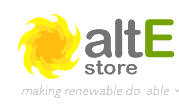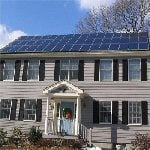Power Your Home Without The Grid!
Homeowners, looking for an efficient way to power your home?
Going off-grid with a solar system may be the perfect solution for you! Solar systems are an environmentally friendly, cost effective way of providing your own energy source. Plus, taking the time to size your system properly ensures you get the maximum efficiency and power out of it initially and in the future.
With no grid limitations and lack of ongoing fees or connections, going off-grid with solar power is a great option for homeowners who want their own independent energy source. It will provide sustainable energy for years to come!
Keep reading to find out more about choosing an off-grid solar system that's right for you! Find a per-designed kit that meets you needs or contact us for a custom off grid quote.
Get a Little Help from the altE Calculators
Off-grid living is appealing for many reasons. Maybe your utility company is unreliable, or power from the utility company in your area is too expensive. Regardless of your reason for going off-grid, the first step is to determine how much power you will need to produce and store. altE's off grid solar calculator and loads list calculator will help you figure out these figures.
Taking the time and effort to evaluate your power needs ensures you are installing a solar system that meets your needs now and into the future. As you size a system to meet your needs you will probably find ways to use less power, whether it's replacing old lighting or appliances. Going off-grid requires maximum efficiency, and identifying ways to become more efficient and reduce waste will make sure you always have the power you need.
In this next video we walk you through altE Store's off-grid solar calculator . The altE off-grid calculator is a great place to start planning your system. The calculator covers everything from the number of solar panels needed, to the number of days of autonomy required for your needs.
Check out our video that outlines the 6 steps required to design a DIY off-grid solar system. We cover everything you need for a DIY solar powered system.
How to Choose the Best Off-Grid Solar System for Your Home
Are you considering installing an off grid solar system in your home? With the rising cost of electricity, an off grid solar system can be a great way to lower your energy bills and reduce your dependence on the utility grid. But how do you choose the best off grid solar system for your home? We'll explore the key factors to consider when selecting an off grid solar system for your home, so you can make the best decision for your needs.
Determine Your Power Needs
Before selecting an off-grid solar system, you’ll need to determine your power needs. To do this, you’ll have to consider how much electrical energy you use on a daily basis and what type of solar batteries you plan to use for energy storage. Your solar battery should be sized to match the daily load and provide enough capacity for any anticipated future power needs. When considering battery capacity, be sure to factor in the amount of energy needed for lights, appliances, electronics, heating and cooling.
When determining your power needs, it’s also important to consider the type of solar batteries you will use. Lead-acid batteries are a common type of solar battery used in off-grid power systems, although there are newer, more efficient lithium-ion batteries now available as well. Lead-acid batteries are typically inexpensive, but require regular maintenance and replacement and have a shorter life span than lithium-ion batteries.
In addition to assessing your current power needs, you should also consider any backup power sources or grid power you may need in the event of a blackout. Stand-alone power systems are designed to provide a source of electricity in the absence of grid power, so it’s important to choose a system that can support your expected energy needs in the event of an emergency.
Choosing the right off-grid solar system is a major decision, and determining your power needs is an essential first step. With careful planning and consideration of your energy requirements and carbon footprint, you can select a system that will help reduce your reliance on the electrical grid and create a more sustainable home.
Read more about the "Components of an off-grid solar power system" in our Resource Library.
Find the Right Solar Panel
When it comes to choosing the right solar panel for your off-grid home solar power system, there are several factors to consider. You need to consider the battery capacity, the type of batteries you will be using (such as lead-acid or deep cycle), and your estimated carbon footprint.
The size of the solar panel will depend on the battery capacity of your solar battery storage system. Your batteries need to store enough electrical energy to power your off-grid system and provide backup power in case of outages.
Finally, you should consider the impact that your off-grid power system will have on the environment. An off-grid system eliminates the need for grid power, reducing your dependence on fossil fuels and your overall carbon footprint. With an off-grid system, you can also use renewable energy sources like solar and wind power, allowing you to reduce your environmental impact even further.
Choosing the right solar panel is an important part of building an off-grid home solar power system. Make sure to take into account your home’s power needs, the type of batteries you plan to use, and the environmental impact of your system before selecting the best solar panel for your needs.
Want to learn more about the different types of solar cells used to make solar panels? Read our Comprehensive Guide to the Different Types of Solar Cells then shop our curated price list of solar panels.
Choose the Right Battery
When selecting a battery for an off-grid home solar power system, it is important to choose the right type of battery that meets your needs. Solar batteries are deep cycle batteries that are designed to store energy and release it as electrical energy when needed.
Lead-acid batteries are most commonly used in off-grid power systems because they offer a high capacity and long battery life. However, there are other types of batteries available such as lithium-ion, which can be more efficient than lead-acid batteries.
When choosing a battery for your off-grid home solar power system, consider the battery’s capacity and its ability to provide backup power when the grid power is down. The battery capacity will determine how much electrical energy you can store in the battery storage system. It is also important to think about how often you will need to charge the battery, since this will affect its battery life.
When selecting a solar battery for your off-grid power system, it is important to consider its environmental impact. Using solar batteries to reduce your carbon footprint is an excellent way to help the environment and make your home greener. By using an off-grid power system instead of relying solely on the electrical grid, you can reduce your electricity costs while still having access to a reliable backup power source.
Read more about solar batteries and then shop our extensive listing of solar battery prices.
Consider an Inverter
When installing an off-grid home solar power system, you must consider an inverter. An inverter is a device that converts the direct current (DC) generated by your solar batteries into alternating current (AC) that can be used to power your home appliances. This is important since most electrical devices and appliances require AC power, not DC power.
Inverters come in many shapes and sizes, and you need to select one based on your energy needs. Generally speaking, a good quality inverter will have a longer lifespan than other components, such as your solar batteries or deep cycle battery. When selecting an inverter, make sure it is compatible with your solar batteries and other components of your off-grid power system.
An inverter also plays an important role in reducing your carbon footprint. It can help you save energy and money by providing a backup power source during times when the grid power is down or unreliable. Plus, if your battery storage systems are big enough, you may not even need to use grid power at all.
When selecting an inverter for your off-grid power system, consider its power efficiency and battery capacity. Inverters can vary in power efficiency and battery capacity, so make sure you choose one that fits your needs and lifestyle. You also want to pay attention to the quality of the inverter and its warranty period since this will affect its overall performance and battery life.
By carefully choosing the right inverter for your off-grid power system, you can ensure that it works efficiently and effectively for years to come. With the right components and an efficient inverter, you can enjoy reliable stand-alone power systems that reduce your carbon footprint and help you save money in the long run.
Read "Inverter Basics" and then shop our off grid inverters.
Identifying a solar charge controller
A solar charge controller is an essential component of any off-grid solar power system. It regulates the electrical power that is generated by the solar panels and sent to the battery. By regulating the flow of electricity, the solar charge controller prevents your battery from overcharging, which can reduce its lifespan. It also optimizes the energy efficiency of the system by ensuring that your battery gets the maximum amount of power from the solar panels.
When selecting a solar charge controller, you should consider its voltage compatibility with your system, as well as the amount of current it can handle. You should also make sure that the solar charge controller is compatible with your other components such as the solar panels and batteries. Additionally, some solar charge controllers come with built-in features like load control and temperature compensation, which can help you further optimize your system’s performance.
Read more about Charge Controllers in our Resource Library and then shop our wide selection of solar charge controllers.
Balance of System parts
The Balance of System (BOS) parts refer to the components necessary for a successful off-grid power system, other than the solar panels and batteries. These parts include all the hardware, wiring, and components necessary to complete the electrical circuit from the solar panel to the battery and then to the point of use.
Take your off-grid living to the next level with solar power.
Get step-by-step guidance for wiring and installing your own home solar system with our DIY tutorial. Are you planning on installing your off-grid solar system yourself? That's great! We're here to help.
In the video below we walk you through wiring your solar system components together for a safe DIY solar installation. You will learn the basic components of an off-grid solar power system, with example schematics.
More importantly, you'll learn how to safely wire and interconnect everything from your DIY solar panels, to your charge controller, battery bank, inverter, and balance of system components.
For further reading, check out our post "Everything You Need to Know About Going Off-Grid with Solar" in our off grid Resource Library. Read more about off grid living in the altE blog. Both Motherearth News and Off the Grid News have further articles about an off grid solar system, and the National Renewable Energy Laboratory. has additional information.






